Coronavirus: How amateur radio is connecting people during lockdown
- Published
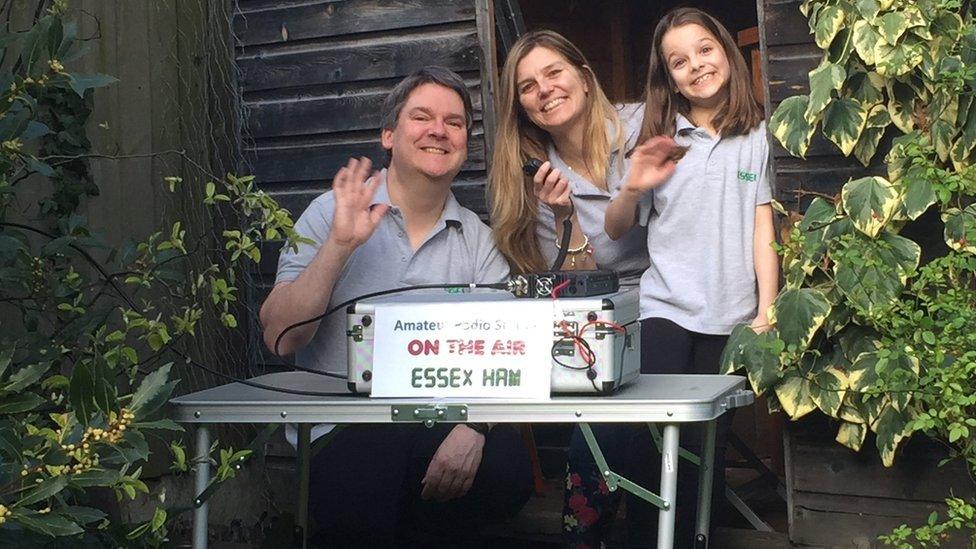
The Sipple family - Pete, Sarah and Kathryn - say they've seen a "massive" spike in interest for online courses
Amateur radio use in the UK has seen a "significant" rise during the coronavirus lockdown as people seek new ways of staying connected. The national body that represents users - the Radio Society of Great Britain (RSGB) - has said many people who formerly enjoyed the hobby are also returning to it.
Mark Rider's social life before the coronavirus lockdown consisted of the occasional trip to the pub, rehearsing with musician friends and visiting his wife in her care home.
"But when I knew that wasn't going to happen any time soon I decided to dust off my amateur radio equipment to seek out some other social interaction," he says.
Mr Rider, a retired engineer from North Warwickshire, said "ragchewing" - or chatting to people on the airwaves - "has become one of the highlights of my day".
"Because I live on my own, and because of lockdown, I knew I couldn't do what I used to do, which wasn't going to be very good for me or my mental health."
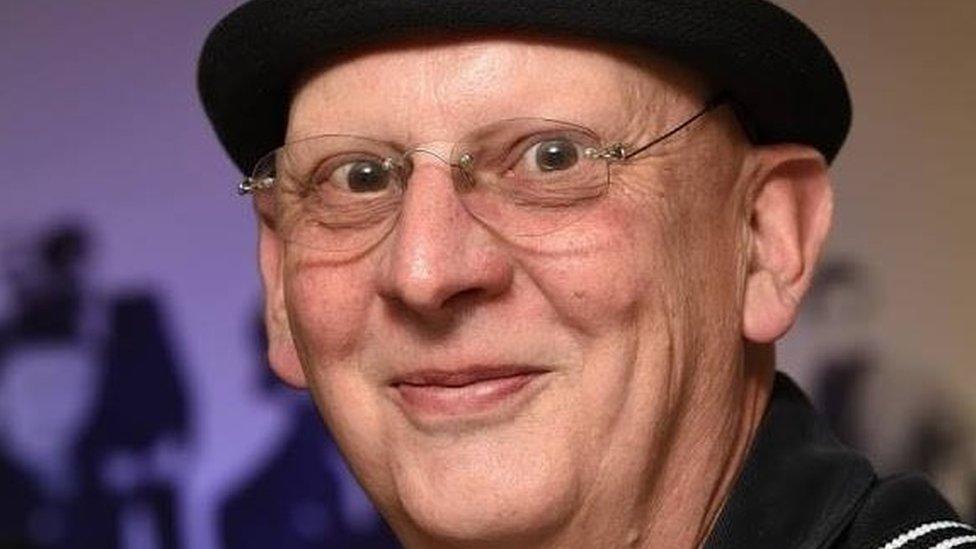
Mark Rider: "Just speaking to somebody else in the same situation is very rewarding"
The 67-year-old says keeping in touch with others has been more important since his wife was taken into care after a stroke.
"Just speaking to somebody else in the same situation is very rewarding," he says.
The RSGB defines amateur radio, external as a "technical hobby for people who want to learn about, use and experiment with wireless communications", like Mr Rider, who uses his radio kit to speak to others using designated radio frequencies.
Steve Thomas, RSGB general manager, says the organisation has experienced a threefold increase in the number of people asking to sit licensing exams since social distancing rules came into place. There are currently about 75,000 licensed users in the UK.
"Across the country, clubs and individual radio amateurs are supporting one another by setting up 'nets', or online meetings," Mr Thomas says.
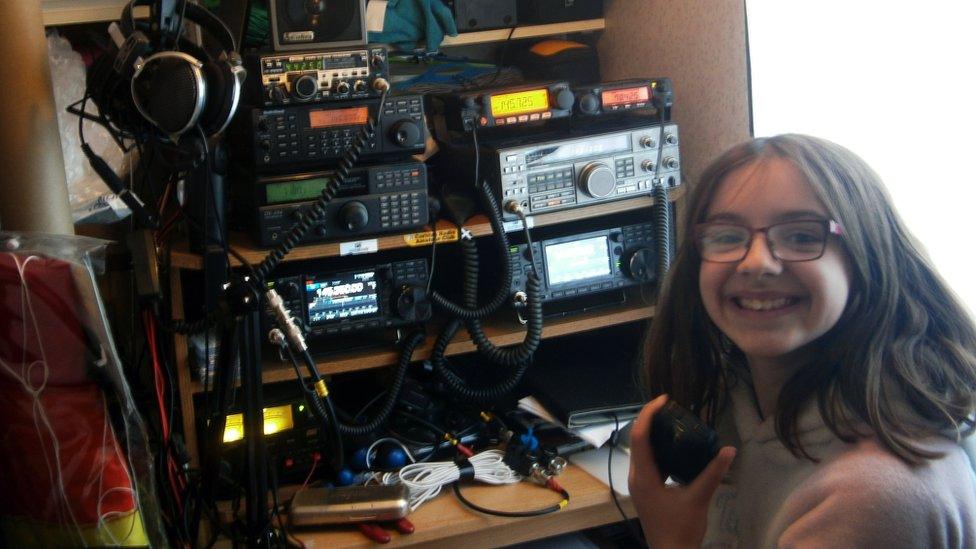
Anne-Marie Rowland has been holding twice-weekly meetings to support her community
Anne-Marie Rowland has been running twice-weekly meetings to help keep people in contact.
The 11-year-old from Leedstown near Hayle in Cornwall, who has held a licence for about a year, set up the transmissions with the Cornish Amateur Radio Club to help keep people in contact during lockdown.
"We have some regulars but also some new people join in," she says.
Dad Bill, who also runs a weekly meeting, says "we're always available with the radio on, there are a lot of older people out there self-isolating, so this helps them feel connected".
Amateur radio users have also been showing their support for the NHS by adding "/NHS" as an extension to their call signs and taking part in a "get on the air to care" campaign (#GOTA2C), aimed at supporting the emotional health and wellbeing of the radio communications community.
An amateur radio call sign, issued by the Government Office for Communication (Ofcom), is a series of letters and numbers unique to each radio operator and allows enthusiasts to identify each other and establish which country they are in.
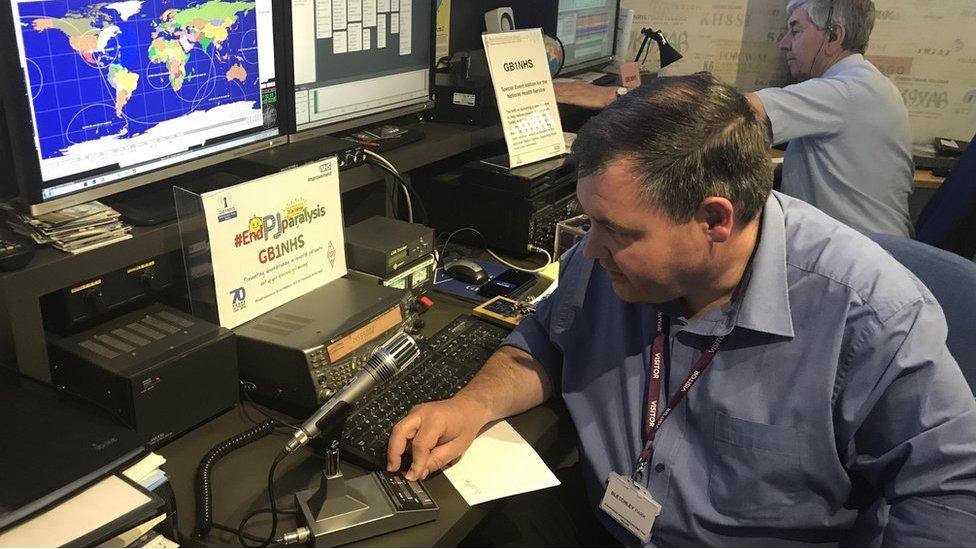
The NHS radio station GB1NHS attracts "queues" of people wanting to engage, says Paul Devlin
Paul Devlin, from the NHS Emergency Care Improvement Support Team, launched the campaign in an "unprecedented" partnership with the RSGB, whose National Radio Centre is based at Bletchley Park in Milton Keynes.
He was responsible for creating the health service's amateur radio station GB1NHS.
"The NHS is the only government level organisation to routinely use amateur radio to help improve the lives of communities globally," he explains.
"We want radio operators to simply get on the air, reach out to fellow enthusiasts and check how they're doing," says the 55-year-old from Lichfield, Staffordshire.
"Being such a well-recognised brand, whenever GB1NHS is on the air we have queues of radio operators wanting to engage with our messages."
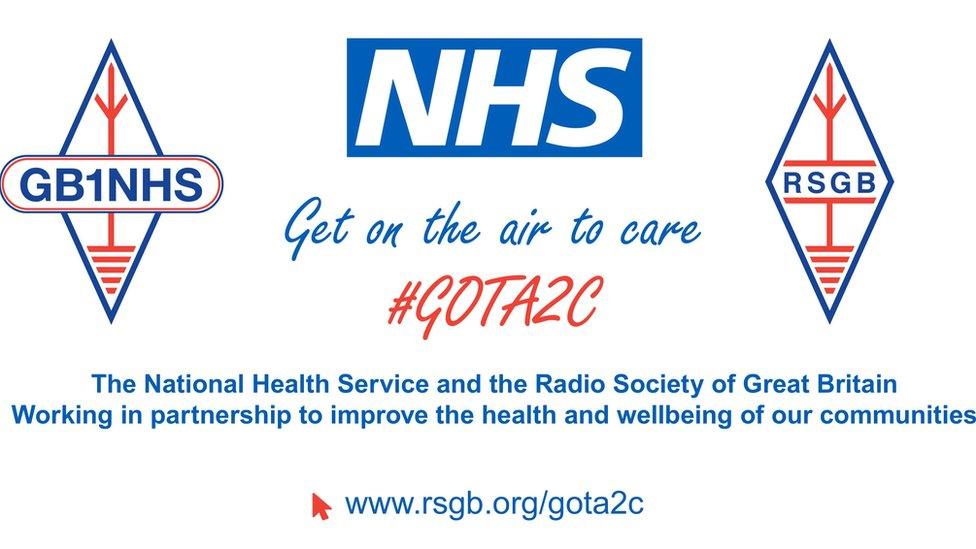
Amateur radio users are being urged to "get on air to care"

Analysis by Jim Lee, BBC Radio announcer and newsreader
I first got hooked by the magic of radio as a schoolboy in Nuneaton. I passed the necessary technical exam and Morse test and got my call sign (G4AEH) dangerously close to my A-Level exams.
Listening to the pirate stations in the 60s made me want to work in radio. When most of them were closed down, tuning around the shortwave bands on a radio that my mum bought for me at a church jumble sale led me to amateur radio.
That was over 50 years ago and even though I spend a lot of time reading the news and introducing programmes for the BBC, communicating around the world with an antenna I've made from a few bits of wire is still part of radio's magic.
Amateur radio is ideal for social distancing and it's no surprise that more and more people are turning to it during this crisis. Social media and video calls are OK, but depend on there being sufficient internet bandwidth for efficient communication.
You can't FaceTime the International Space Station, but there have been occasions when radio amateurs have been able to speak to the astronauts via their radio sets in a shed or back bedroom.
The digital world and amateur radio can exist side by side. There's no way the new kid on the block will replace the magic of talking to someone on the other side of the world with less power than it takes to run a light-bulb. It's science in action.

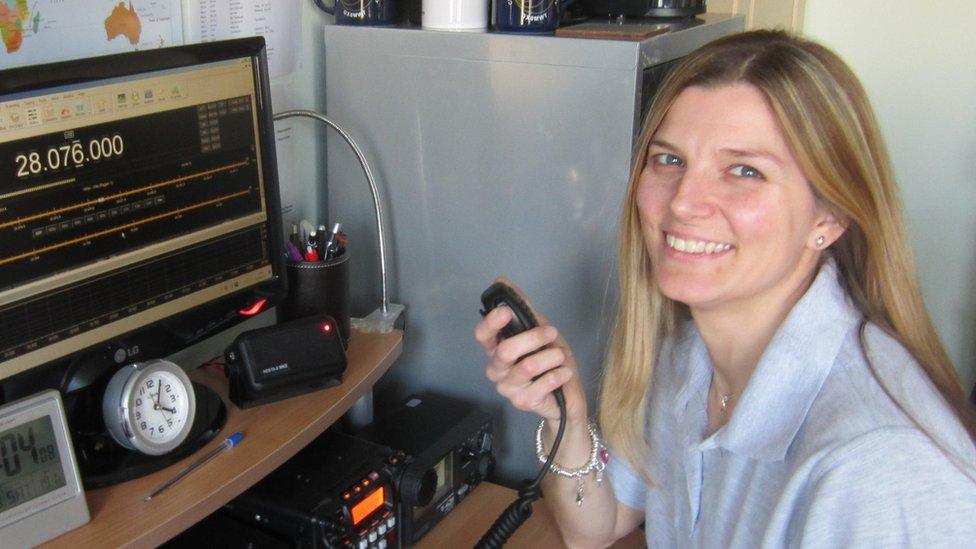
Sarah Sipple helps run the Essex Ham club with husband Pete
The RSGB introduced remote invigilation in the middle of April to allow people to take their foundation exam - the entry step to obtaining an amateur radio licence.
Pete Sipple, 50, from Leigh-on-Sea, who runs the Essex Ham amateur radio club with his wife Sarah, has been offering online training courses, external for the exam for some time but says since the coronavirus lockdown he's seen a "massive" surge in demand.
"We've had 1,135 people apply for a course so far this year, and due to the Covid demand, are running two courses a month instead of one," he says.
Mrs Sipple, 46, says she's noticed a rise in transmissions from people who haven't been on air very recently.
"Pete has been getting messages saying, 'I haven't used the radio for six or seven years, can you just help me get back into it?'"
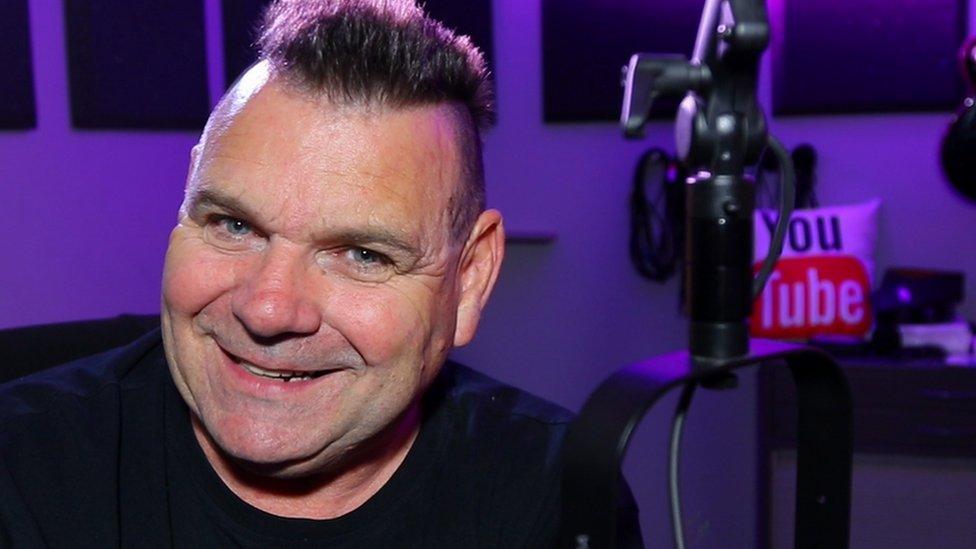
Callum McCormick was able to mobilise help for a man "down to his last half cup of milk"
Callum McCormick, a 61-year-old antenna manufacturer, hosts a daily amateur radio welfare "net" for the over-65s from his home in Lapworth, Warwickshire. It has reached hundreds of users, with thousands more watching via his YouTube channel.
"The oldest user who has been in touch is 101-year-old George from Dorchester who just wanted to call and tell us he and his wife Ivy were being looked after by their daughter and were OK."
Mr McCormick says he was able to help one disabled and housebound user "who was down to his last half cup of milk".
"He'd been calling in and over the days I'd clocked he needed help, so I managed to mobilise a response to get some shopping to him and he's now being looked after by the council," Mr McCormick says.
"I wanted to do something for the old boys who were feeling a little bit lost and isolated."

A SIMPLE GUIDE: How do I protect myself?
AVOIDING CONTACT: The rules on self-isolation and exercise
HOPE AND LOSS: Your coronavirus stories
LOOK-UP TOOL: Check cases in your area

Follow BBC West Midlands on Facebook, external, Twitter, external and Instagram, external. Send your story ideas to: newsonline.westmidlands@bbc.co.uk , external